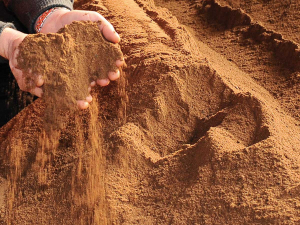Upper North Island Storms: Limited impact on dairy farms
For the most part, dairy farmers in the Waikato, Bay of Plenty, Tairawhiti and the Manawatu appear to have not been too badly affected by recent storms across the upper North Island.
 About 15 to 20% of what New Zealand dairy cows eat isn’t pasture, but supplementary feed, including PKE.
About 15 to 20% of what New Zealand dairy cows eat isn’t pasture, but supplementary feed, including PKE.
Dairy farmers' reliance on imported palm kernel expeller (PKE) as a supplementary feed faces headwinds amid shifting consumer preferences and environmental obligations to reduce greenhouse gas emissions, says AgFirst Waikato consultant Raewyn Densley.
This will drive farmers to look for supplementary feed options closer to home, providing opportunities for domestic maize silage and feed grain growers.
"From a crop perspective and for the New Zealand arable industry this is exciting because crops like maize have much lower GHG emissions than PKE," Densley told the Foundation for Arable Research's maize conference in Hamilton.
Significant expansion in the dairy industry between 1990 and 2020 grew the national herd by 2.6 million cows to 5 million and production by 132 kgMS/cow. An extra 730,000 hectares was converted into dairying, much of this arable land in Canterbury.
This led to a massive increase in feed demand on dairy farms, from 9.3 to 23.6 million tonnes of drymatter eaten a year, driven by more cows, more hectares and more production per cow, said Densley.
"Over time, we have gone from a pasture-based dairy farm system to one that is still pasture-based, but is also quite reliant on other feed."
About 15 to 20% of what New Zealand dairy cows eat isn't pasture, but supplementary feed, including PKE (a byproduct of the palm oil extraction process), fodder beet and maize silage.
Use of harvested crops like maize silage and feed barley, as well as grown supplements like fodder beet, kale and swedes, is increasing by 5.6% a year. Imported feed, particularly PKE, is increasing even more, by 9% each year.
"We think we are a pastoral dairy system and relatively self-contained, but 11 per cent of feed used to feed our cows is produced internationally."
Globally, New Zealand is the biggest importer of PKE at 21.3%, with most coming from Indonesia and Malaysia.
This brings sustainability issues, Densley said.
Globally there is a western consumer trend away from palm oil, with a lot of big companies backing research into alternatives. She said some consumers are turning away from dairy products made from cow fed PKE, with Fonterra placing limits on PKE use by its milk suppliers.
Consumers want milk products with a low GHG footprint but PKE has issues with deforestation, methane production from palm oil extraction and higher carbon losses than pasture, maize silage and grain.
"While New Zealand farmers are just getting their head around their GHG obligations from a government perspective, the reality is that the world has moved on. Consumers are not just interested in on-farm losses they are also interested in embedded losses associated with farm inputs," Raewyn Densley says.
Climate change means farmers will continue to need more than just pasture to sustain their herds but there is likely to be a move away from internationally-produced feeds.
While buying in locally-produced crops will be the preferred option for some farmers, others may investigate dropping their stocking rate and cropping on farm.
Modelling for an AgFirst study Densley was involved with, funded by Our Land and Water, showed that a North Island dairy farm system using homegrown feed was generally more profitable than one with imported feed.
Agrisea NZ has appointed Craig Hudson as it's new chief growth officer.
State farmer Landcorp, trading as Pamu, is a forecasting a full-year net profit of around $100 million.
Tony Aitken, chief executive of Ruralco, has been awarded the Excellence in Business Leadership Award at the ANZ Business of the Year Awards.
Global trade has been thrown into another bout of uncertainty following the overnight ruling by US Supreme Court, striking down President Donald Trump's decision to impose additional tariffs on trading partners.
Controls on the movement of fruit and vegetables in the Auckland suburb of Mt Roskill have been lifted.
Fonterra farmer shareholders and unit holders are in line for another payment in April.
OPINION: Staying with politics, with less than nine months to go before the general elections, there’s confusion in the Labour…
OPINION: Winston Peters' tirade against the free trade deal stitched with India may not be all political posturing by the…